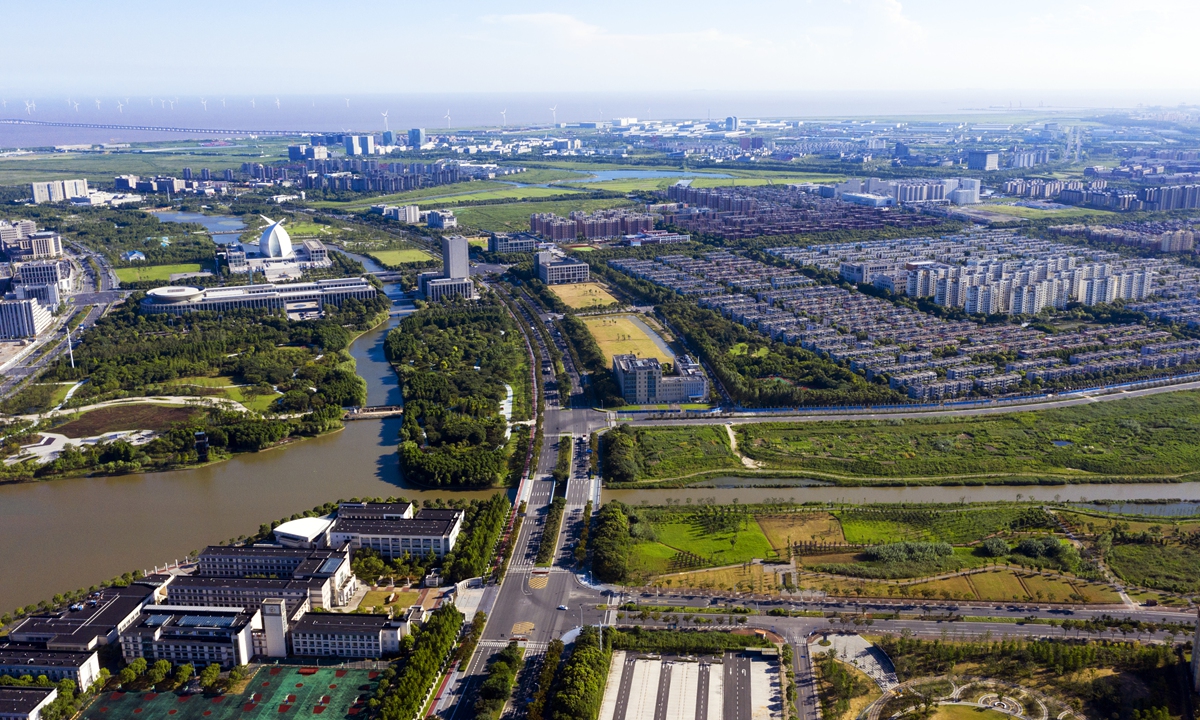
An aerial view of Lingang New Area in Shanghai's Pilot Free Trade Zone. Photo: cnsphoto
Shanghai's Lingang New Area announced a talent cultivation project over the weekend that plans to create 180,000 jobs in three years with preferential housing policies for certain talents, as the major economic pilot area aims for greater, high-tech development after remarkable achievement over the past three years.
Already home to many major global high-tech companies like Tesla, the Lingang New Area also vowed to foster three 100-billion-yuan ($14.7 billion) level industrial clusters, including new-energy vehicles, high-end equipment, and integrated circuits (IC).
In terms of attracting talent, Lingang has become the area with the best policies and highest intensity and autonomy across Shanghai, Ye Linlin, vice director of the Shanghai Municipal Human Resource and Social Security Bureau, said at a press conference on Saturday.
Under the new policy announced on Saturday, certain non-local talents who work in the area will be able to buy one apartment after paying income tax or social security for one year.
Saturday marked the third anniversary of the establishment of the Lingang New Area. Over the past three years, the area has attracted over 90,000 talents.
An abundance of advanced talents is one of Lingang's advantages, especially as it has focused on the development of high-tech industries, Xi Junyang, a professor at Shanghai University of Finance and Economics, told the Global Times on Sunday.
Shanghai itself has attracted large numbers of talents with many colleges and research institutions, which has allowed Lingang to further roll out many preferential policies to attract talent, such as those for apartment purchases, Xi said.
In addition to the talent advantage, Lingang has a great position that links Shanghai and the global market, paving the way for both domestic and foreign firms to set up in the area, Xi noted.
Lingang is also where Tesla's Shanghai gigafactory is located. Tesla's Shanghai gigafactory started construction in Lingang in January 2019, and began production within one year. The factory completed production of one million units on August 15, making it Tesla's most productive gigafactory, according to media reports.
Lingang has gathered over 150 IC companies, covering chip design, equipment manufacturing, key materials, assembly and testing and other fields. In 2021, the scale of the IC industry in Lingang exceeded 10 billion yuan for the first time.
A total of 22 new IC projects were signed in Lingang in February, with an investment worth 23.3 billion yuan. Lingang has vowed to further enhance the development of the industry in the future.
In the three years since its establishment in 2019, Lingang's GDP has increased by an average annual rate of 21.3 percent, and the total output value of industries above designated size in the area grew by an average annual rate of 40.2 percent.
The amount of foreign capital actually used in Lingang has doubled on a yearly basis over the past three years, and 1,196 projects were concluded in the period, with a total investment of 650 billion yuan.
By 2025, Lingang aims to further form world-class industrial clusters and make advanced manufacturing the basis of its growth.
Lingang also vowed to carry out pressure tests for opening up even more, planning to ramp up efforts in the development of cross-border finance, offshore trade, digital economy, and other major sectors.
Global Times




